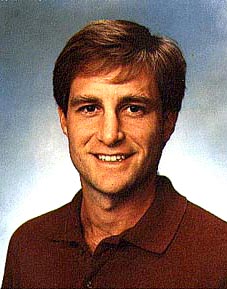

|
Back to |
| The Front Page |
| 1997 Archives |

GREAT BRITAIN TRIUMPHS IN BOTH
INTERNATIONAL AND AMERICAN RULES
by Bob Alman
The 1997 Solomon Trophy matches included 76 games and 29 triple peels - most of them British. John Taves, Mik Mehas, and Don Fournier each won one of their singles games, and the partnership of Taves/Fournier scored the only American win in doubles. On the British side, Clarke, Comish, and Avery were undefeated. From the first day, the outcome seemed virtually certain. The British had a powerful team in top form.
The Americans had put together the best team possible, but it was immediately clear that they weren't in top form. Both teams agree that the Americans didn't start playing until the third day of the Solomon. On that day, Taves and Fournier scored the first American victory - in doubles against Burridge and Openshaw.
Thursday was even better, although the Americans had officially lost the test by midday, when the British score passed the magic number of eleven. But on Thurday, the Americans won two of the 6 singles matches of the day, with a third pegged down at two games all that was to be completed the next day.
TAVES BREAKS FULFORD'S WINNING STREAK
The uncompleted game produced perhaps the biggest news of the tournament. John Taves, America' s #1 ranked team member, defeated Robert Fulford, Britain's #1 ranked team player and acknowledged as the best player in the world. Taves' feat ended one of the longest streaks in modern croquet times: Fulford had won 44 consecutive matches in international team play. Not since 1990 has Fulford lost such a match in either singles or doubles.
John TavesAfter that high point, the Solomon wound to a close with the British winning all of Friday's doubles matches. The final score was 16 to 4, with one doubles match tied at 2/2 and never to be completed.
Following five days of serious International Rules play that saw the Americans slowly coming into form mid-way a tightly scheduled test again the British, the sixth day - reserved for American rules all-play-all doubles - was a relaxed and social affair.
All the American Solomon Team had gone home, and a second field of Americans came in to meet the British Solomon Team, well warmed up after 78 games and 20 matches. The largest gallery of spectators of the tournament was on hand on this weekend day, expecting to be entertained by the spectacle of the British - baffled and befuddled by the intricacies of American tactics and strategy - make enough fatal errors to give the President's Cup to the Americans.
THEY DON'T KNOW THE GAME, BUT THEY WIN IT ANYWAY
It was not to be. Although there were several cliff-hangers and few games went to the peg, the British pulled every one of them out, often in last turns. How? With excellent shot-making. Although the Brits missed many tactical opportunities unique to the American game, and often had to pause to ask about the rules, the Americans made just enough shooting errors to give them every win.
The team of Burridge (head of the British Selection Committee) and Chris Clarke (current world champion) looked especially unsteady. Burridge had no experience in the game at all, and Clarke had played only two American rules games in competition in his life. When asked before the match what he thought of the American game, he said simply, "I hate it."
Nevertheless, Clarke played like the tough competitor he is. He even dared to make an "advanced" American rules play of setting up at the first hoop in his game against the team of Rhys Thomas (croquet pro at Sherwood and manager of the event) and Don Fournier of Arizona. When Thomas and Fournier displaced Clarke's ball and thereupon embarked on a complex strategy of repeatedly cannoning his ball out of position at #1, then rushing to clear their next wicket and repeating their persecution of Clarke in the next rotation, the Americans on the sidelines nodded sagely to one another and sat back to enjoy the ballet, as the clock ticked down time.
But alas, only 30 of the 90 minutes were consumed before Clarke got into the game. But Thomas had another American trick up his sleeve. Already for four-back, He attacked and routed partner out of bounds near the opponents' hot ball to set up a break for partner beginning at #3.
But alas again, Fournier stuck, and the Clarke/Burridge team came out on top of a long nip-and-tuck when time ran out
In the final period, this reporter saw another dubious display by this same team against Bob Rebuschatis and Ren Kraft. Again, by dint of excellent shooting, they came out ahead by a small margin. By this time, Burridge appeared to have a headache from following many hours' permutation of deadness, and Clarke was getting ragged around the edges. After it was clear that the Brits had won all the games, he was asked again, "Don't you like the American game better, now that you see how easily you can win it?" "Do I like playing the American game? I'd rather stick my head in a cesspool", he replied. But he said it with a polite smile.
It was an easy, three-period day with a hearty barbecue in the middle - a day made for cameraderie before the Brits departed in the late afternoon to explore Southern California nightlife before returning to England on Sunday.
At croquet, the Brits are the best. They have now beaten the Americans at their own game.
CROQUET WORLD will soon feature a picture story on the Solomon and Carter events including final playing stats. Also upcoming is the Carter Challenge event between the American and the Irish and a new edition of COURTSIDE CHATS which includes an interview with Chris Clarke.
